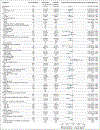Adjuvant Nivolumab versus Placebo in Muscle-Invasive Urothelial Carcinoma
- PMID: 34077643
- PMCID: PMC8215888
- DOI: 10.1056/NEJMoa2034442
Adjuvant Nivolumab versus Placebo in Muscle-Invasive Urothelial Carcinoma
Erratum in
-
Adjuvant Nivolumab versus Placebo in Muscle-Invasive Urothelial Carcinoma.N Engl J Med. 2021 Aug 26;385(9):864. doi: 10.1056/NEJMx210012. N Engl J Med. 2021. PMID: 34437799 No abstract available.
Abstract
Background: The role of adjuvant treatment in high-risk muscle-invasive urothelial carcinoma after radical surgery is not clear.
Methods: In a phase 3, multicenter, double-blind, randomized, controlled trial, we assigned patients with muscle-invasive urothelial carcinoma who had undergone radical surgery to receive, in a 1:1 ratio, either nivolumab (240 mg intravenously) or placebo every 2 weeks for up to 1 year. Neoadjuvant cisplatin-based chemotherapy before trial entry was allowed. The primary end points were disease-free survival among all the patients (intention-to-treat population) and among patients with a tumor programmed death ligand 1 (PD-L1) expression level of 1% or more. Survival free from recurrence outside the urothelial tract was a secondary end point.
Results: A total of 353 patients were assigned to receive nivolumab and 356 to receive placebo. The median disease-free survival in the intention-to-treat population was 20.8 months (95% confidence interval [CI], 16.5 to 27.6) with nivolumab and 10.8 months (95% CI, 8.3 to 13.9) with placebo. The percentage of patients who were alive and disease-free at 6 months was 74.9% with nivolumab and 60.3% with placebo (hazard ratio for disease recurrence or death, 0.70; 98.22% CI, 0.55 to 0.90; P<0.001). Among patients with a PD-L1 expression level of 1% or more, the percentage of patients was 74.5% and 55.7%, respectively (hazard ratio, 0.55; 98.72% CI, 0.35 to 0.85; P<0.001). The median survival free from recurrence outside the urothelial tract in the intention-to-treat population was 22.9 months (95% CI, 19.2 to 33.4) with nivolumab and 13.7 months (95% CI, 8.4 to 20.3) with placebo. The percentage of patients who were alive and free from recurrence outside the urothelial tract at 6 months was 77.0% with nivolumab and 62.7% with placebo (hazard ratio for recurrence outside the urothelial tract or death, 0.72; 95% CI, 0.59 to 0.89). Among patients with a PD-L1 expression level of 1% or more, the percentage of patients was 75.3% and 56.7%, respectively (hazard ratio, 0.55; 95% CI, 0.39 to 0.79). Treatment-related adverse events of grade 3 or higher occurred in 17.9% of the nivolumab group and 7.2% of the placebo group. Two treatment-related deaths due to pneumonitis were noted in the nivolumab group.
Conclusions: In this trial involving patients with high-risk muscle-invasive urothelial carcinoma who had undergone radical surgery, disease-free survival was longer with adjuvant nivolumab than with placebo in the intention-to-treat population and among patients with a PD-L1 expression level of 1% or more. (Funded by Bristol Myers Squibb and Ono Pharmaceutical; CheckMate 274 ClinicalTrials.gov number, NCT02632409.).
Copyright © 2021 Massachusetts Medical Society.
Figures



Comment in
-
Adjuvant nivolumab improves survival after radical cystectomy.Nat Rev Urol. 2021 Aug;18(8):444. doi: 10.1038/s41585-021-00493-x. Nat Rev Urol. 2021. PMID: 34131328 No abstract available.
-
Nivolumab as adjuvant therapy.Nat Rev Clin Oncol. 2021 Aug;18(8):470. doi: 10.1038/s41571-021-00534-9. Nat Rev Clin Oncol. 2021. PMID: 34145430 No abstract available.
-
Adjuvant Nivolumab in Muscle-Invasive Urothelial Carcinoma.N Engl J Med. 2021 Sep 2;385(10):956. doi: 10.1056/NEJMc2110897. N Engl J Med. 2021. PMID: 34469654 No abstract available.
-
Adjuvant Nivolumab in Muscle-Invasive Urothelial Carcinoma.N Engl J Med. 2021 Sep 2;385(10):956-957. doi: 10.1056/NEJMc2110897. N Engl J Med. 2021. PMID: 34469655 No abstract available.
-
Perioperative Immune Checkpoint Inhibitors in Renal Cell and Urothelial Carcinomas: An Exciting New Paradigm under Investigation?Oncology. 2021;99(11):681-685. doi: 10.1159/000518741. Epub 2021 Sep 8. Oncology. 2021. PMID: 34515202 No abstract available.
References
-
- Alfred Witjes J, Lebret T, Compérat EM, et al. Updated 2016 EAU guidelines on muscle-invasive and metastatic bladder cancer. Eur Urol 2017;71:462–75. - PubMed
-
- National Comprehensive Cancer Network. Bladder cancer version 6. 2020. (https://www.nccn.org/professionals/physician_gls/pdf/bladder.pdf). - PubMed
-
- Rouprêt M, Babjuk M, Burger M, et al. European Association of Urology guidelines on upper urinary tract urothelial carcinoma: 2020 update. Eur Urol 2021;79:62–79. - PubMed
-
- Stein JP, Lieskovsky G, Cote R, et al. Radical cystectomy in the treatment of invasive bladder cancer: long-term results in 1,054 patients. J Clin Oncol 2001;19:666–75. - PubMed
Publication types
MeSH terms
Substances
Associated data
Grants and funding
LinkOut - more resources
Full Text Sources
Other Literature Sources
Medical
Research Materials
